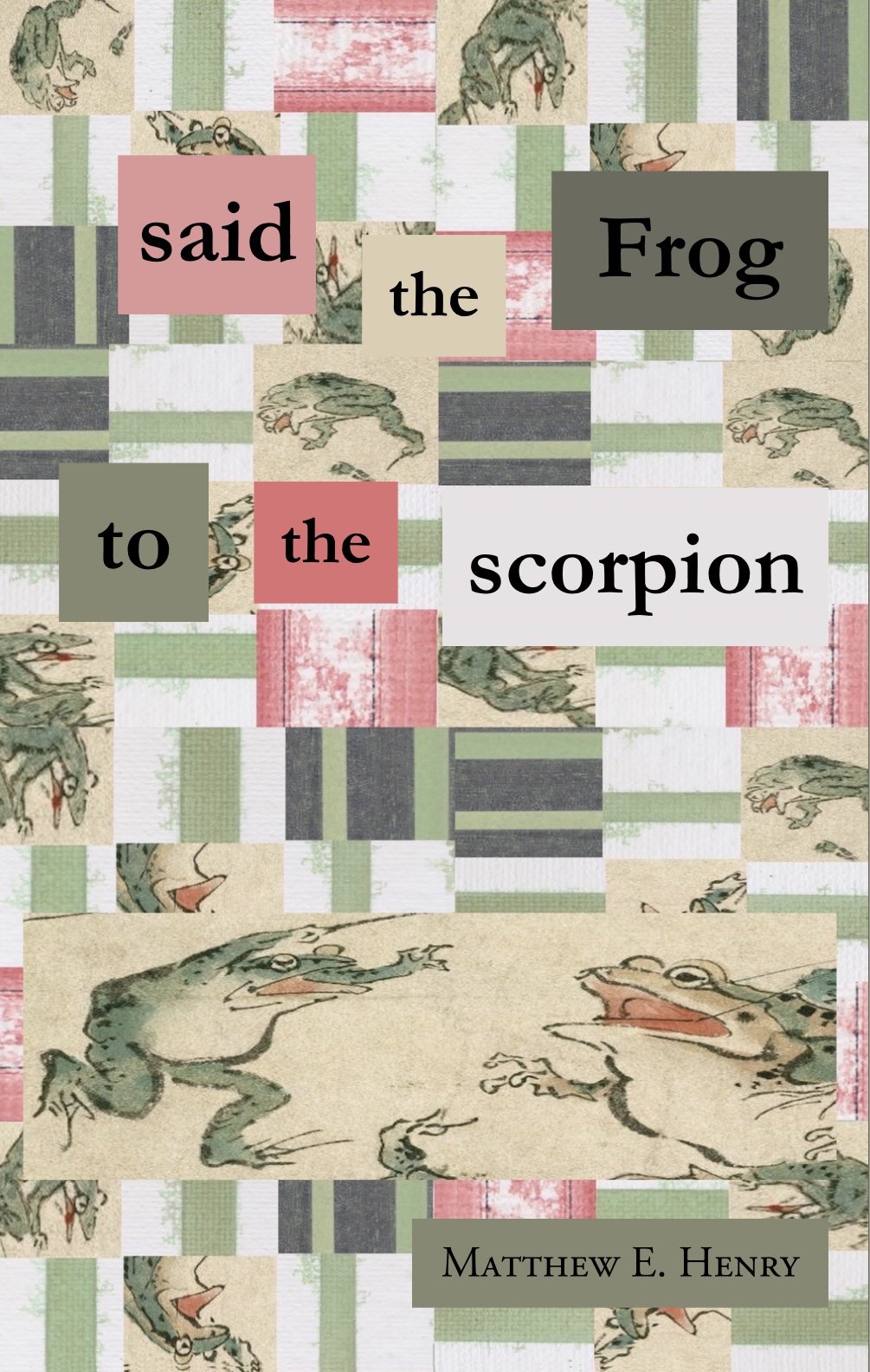Purchase said the Frog to the scorpion!
Cover art: Frog Battle Quilt, C. R. Resetarits
Praise for said the Frog to the scorpion:
Matthew E. Henry’s said the Frog to the scorpion is a haunting reflection on social isolation as a black teacher in a predominately white school. The misunderstandings that infiltrate this collection emphasize the jarring duality of Henry’s lived experience. “you’re not real. not a ghost / of someone who once was” serves to highlight the difference that penetrates this collection with the cold reality intertwined with a loving endearment unique and warming. To summarize, this book presents an apt and rousing narrative that pays homage to racial difference and the teaching profession without surrendering oneself to any preconceived notions of either. A definite must read.
—A.R. Salandy, author Half Bred & The Sands of Change
said the Frog to the scorpion by Mathew E. Henry, is the searing testimony of a Black public school teacher in a mostly white, American school. In it, the author confronts what is too often left unspoken: the unacknowledged damage caused by our failures as a nation and as individuals to dismantle systematic racism. Henry asks readers to think beyond deciding “whether blame can be laughed away / or buried” and instead, invites us to face ugly truths head on. Said the Frog to the Scorpion takes brilliant, unexpected risks through reclaiming forms found in public schools: fairy tale retellings, pop quizzes, erasures, formative & summative assessments and a bingo board. In some poems, he also addresses a former lover, though we are unsure as we read, whether this person is a person or an institution. These are poems that challenge us to build a new world from the bars of broken cages, to insist on more than how “we hold to whatever keeps us going until / something better comes along, and then / we hold on to that.” Ultimately, Henry inspires us to examine our own complicity and the damage we have experienced, demands that we become willing to do what is necessary to effect true change, and to know “what you will say— / what you will do—when the time comes, / compared to what you are doing right now.” This collection is necessary for everyone who has taught or attended school in America, for everyone who thinks they are not racist, and for anyone brave enough to be part of the solution.
—Joan Kwon Glass, author of Night Swim
Like the smooth skin that grows back beneath a scab, the poems in said the Frog to the scorpion are both scarring and tender. Formally dextrous and sharp-witted, Henry’s poems confront issues of race and loneliness both within systems and the self. Here a poem alluding to Frost’s “Mending Wall” becomes a scathing indictment of the prejudices of a McMansion-strewn suburb. Here, the Dukes of Hazard and Goldilocks teach important lessons about what “harm” can mean. Here, despite the exhaustion of being treated as “a lawn jockey, a comfortable token, prominently placed,” there is hope for something better, a safe crossing to a sweeter shore.
—Donna Vorreyer, author of To Everything There Is
Matthew E. Henry (MEH) is the author of six collections, including the Colored page (Sundress Publications, 2022) and The Third Renunciation (NYQ Books, 2023). He is editor-in-chief of The Weight Journal and an associate poetry editor at Pidgeonholes and Rise Up Review. The 2023 winner of the Solstice Literary Magazine Stephen Dunn Prize, MEH’s poetry appears in Massachusetts Review, Ninth Letter, Ploughshares, Shenandoah, and The Worcester Review among others. MEH is an educator who received his MFA yet continued to spend money he didn’t have completing an MA in theology and a PhD in education. You can find him at www.MEHPoeting.com writing about education, race, religion, and burning oppressive systems to the ground.



